Search Results for Tag: training
Training Malian journalists during tense political times
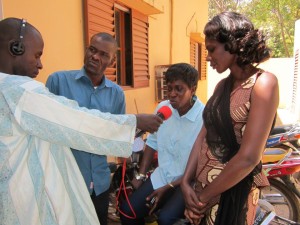 The DW-AKADEMIE workshop on election reporting in Bamako is taking place during a time of real political uncertainty in Mali. Already there had been questions about whether the government was adequately prepared to hold the elections. And then in January, Tuareg rebels started attacking towns in northern Mali and that conflict has been going on ever since.
The DW-AKADEMIE workshop on election reporting in Bamako is taking place during a time of real political uncertainty in Mali. Already there had been questions about whether the government was adequately prepared to hold the elections. And then in January, Tuareg rebels started attacking towns in northern Mali and that conflict has been going on ever since.
The first round of the presidential elections is scheduled for 29 April – about six weeks from now. But Mali doesn’t feel in full election mode yet. With all the potential problems that might arise people are wondering whether the elections will be held on the scheduled day. Political parties aren’t campaigning as aggressively as you might expect. People aren’t discussing the elections with as much passion as usual.
![]() read more
read more
East4South: Communication, coordination and cameras
As you may have read in earlier posts East4South is a unique journalism project that enables African journalists to research and produce stories with journalists from Eastern European countries.
Ten African journalists recently teamed up with ten Eastern European journalists for the third cycle of the East4South. The European journalists travelled through the home country of their African partner to research stories. Then together they produce their stories at the DW Akademie in Bonn.
The latest group brought back materials to produce a diverse range of stories from milk farming in South Africa, the struggles of Congolese female politicians to the glitz of Nigeria’s Nollywood, the world’s second largest film-making industry.
![]() read more
read more
Creating confidence in the classroom
Active acquisition of knowledge to solve concrete challenges creates confidence. And that’s something you need when you have to teach journalism to a classroom full of young Laotian twentysomethings, as do the instructors at the National University of Laos (NUOL).
These instructors are currently students themselves: they’re taking part in journalism teachers’ training and coaching, which is organized in partnership with DW-AKADEMIE’s Asia team.
At a workshop in December we reviewed some of the progress made so far. “I have more confidence in teaching these subjects now,” said one of the younger colleagues. Others agreed.
One senior lecturer brought along a revamped version of a project the training participants had created the previous September – a newspaper made from scratch. It was a showcase item at NUOL’s 15th anniversary celebration in November.
The instructors-in-training had put tremendous effort into producing it, and that has really paid off in their daily work. Here’s why:
![]() read more
read more
Getting everyone up to speed in a converged Himalayan newsroom
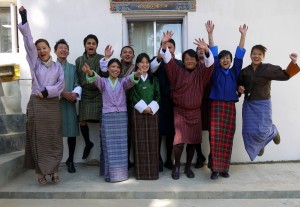 Even high in the Himalayas, reporters these days are being asked to do more.
Even high in the Himalayas, reporters these days are being asked to do more.
As part of a modernization drive, Bhutan Broadcasting Service (BBS) has combined their radio and television newsrooms. In the future, reporters will be required to provide news reports in both media. It’s hoped that the convergence will allow the state-funded station to cut costs and do more with limited resources.
It was against this background that two DW-AKADEMIE trainers went to Bhutan’s high-altitude capital Thimphu to conduct a workshop with an enthusiastic group of 12 young BBS journalists. While several already had some radio production experience, many had previously only worked on the TV side of things.
Together, the group started with a review of the basics, such as news judgment and news writing for radio, before moving on to the interview and how to ask that all-important first question that will grab your listeners and keep them from turning the dial.
![]() read more
read more
African Stories: different countries but facing similar challenges
I think for any trainer it’s very satisfying after two weeks of intensive television production training to see on the last day, participants proudly holding in their hands the DVD featuring the TV stories they had produced during the course. But most importantly for participants, they’re returning to their home stations from the African Stories workshop in Kampala with feature stories ready for broadcast and motivated to put new storytelling skills into practice.
![]() read more
read more
Reporting changing climate from an African perspective
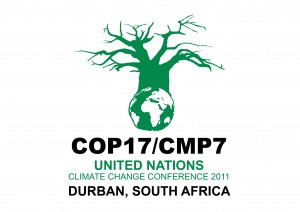 From desertification in the north to floods in the south, from famine to the spread of malaria: Africa is a continent already heavily affected by phenomena attributed to climate change. Yet Africa’s contribution to greenhouse gas emissions driving the process is minimal and the discussion around climate change is often focused on industrialized countries.
From desertification in the north to floods in the south, from famine to the spread of malaria: Africa is a continent already heavily affected by phenomena attributed to climate change. Yet Africa’s contribution to greenhouse gas emissions driving the process is minimal and the discussion around climate change is often focused on industrialized countries.
At the United Nations Climate
Change Conference (COP17) starting in Durban on November 28, DW-AKADEMIE will be supporting radio journalists to offer an African perspective on climate change for their local listeners.
The two-week workshop Reporting Climate Change will bring together journalists from eight countries: Ethiopia, Ghana, Kenya, Mozambique, Namibia, Nigeria, Tanzania and Zambia. The participants are experienced radio reporters who have taken part in previous DW-AKADEMIE courses. From Durban they will produce news reports on the latest developments at the conference and provide detailed background information on the topic of climate change.
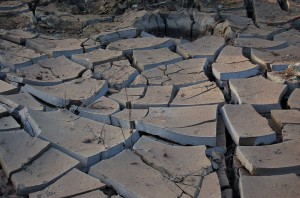 Working closely with the Heinrich Böll Foundation, Bush Radio from Cape Town and the United Nations Framework Convention on Climate Change (UNFCCC), the Reporting Climate Change workshop intends to give the journalists a head start on their research. Plans include a visit to a project site of the Clean Development Mechanism (CDM), a meeting with delegates from African countries and participation in panel discussions with experts of the UNFCCC.
Working closely with the Heinrich Böll Foundation, Bush Radio from Cape Town and the United Nations Framework Convention on Climate Change (UNFCCC), the Reporting Climate Change workshop intends to give the journalists a head start on their research. Plans include a visit to a project site of the Clean Development Mechanism (CDM), a meeting with delegates from African countries and participation in panel discussions with experts of the UNFCCC.
DW-AKADEMIE project managers Aarni Kuoppamäki and Marc Seidel will be in Durban to lead the workshop and reports from participants will be featured on our blog in December.
(Photo credit: Flickr user Matt and Kim Rudge, some rights reserved)
Producing compelling African stories
Turn around and you will find a story to tell. That’s what DW-Akademie’s new journalism training project African Stories is all about: African journalists telling African stories and taking a closer look at their society.
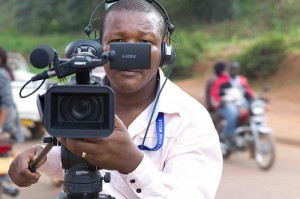 In short, the project aims to train journalists to produce interesting and professionally produced TV reports and documentaries – offering their audience an African perspective on a number of issues ranging from environmental protection, economic development and governance to poverty reduction, health and education.
In short, the project aims to train journalists to produce interesting and professionally produced TV reports and documentaries – offering their audience an African perspective on a number of issues ranging from environmental protection, economic development and governance to poverty reduction, health and education.
African Stories is also ambitious in scale involving broadcasters from across the continent. Television stations participating in the project send a production team to attend a two-week training course. The reports produced by each team during the training are in turn made available to all of the participating broadcasters.
To give you a better idea of the project, here are some stories produced during the recent workshop in Kampala in June.
![]() read more
read more
Médecine naturelle et mères abondonnées – Histoires Africaines au Maroc
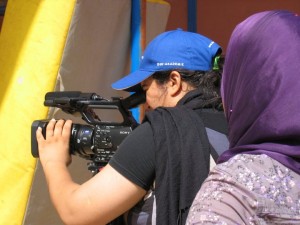 La première partie de notre grand projet “Histoires africaines – Reportages TV” (African Stories – read more in English) vient de se terminer. Neuf participants venant du Maroc, d’Algérie et de Tunisie y ont participé pendant les deux dernières semaines de juin. L’atelier s’est déroulé dans les locaux de l’ISIC (Institut Supérieure d’Information et de Communication), à Rabat au Maroc. Au cours de cet atelier, les participants ont travaillé en équipes nationales. Chaque équipe consistant en un opérateur, un monteur vidéo et un journaliste. Les trois membres de chaque équipe ont collaboré étroitement en effectuant ensemble le travail de recherche, la conception et la réalisation du reportage (du tournage jusqu’à la rédaction du manuscrit).
La première partie de notre grand projet “Histoires africaines – Reportages TV” (African Stories – read more in English) vient de se terminer. Neuf participants venant du Maroc, d’Algérie et de Tunisie y ont participé pendant les deux dernières semaines de juin. L’atelier s’est déroulé dans les locaux de l’ISIC (Institut Supérieure d’Information et de Communication), à Rabat au Maroc. Au cours de cet atelier, les participants ont travaillé en équipes nationales. Chaque équipe consistant en un opérateur, un monteur vidéo et un journaliste. Les trois membres de chaque équipe ont collaboré étroitement en effectuant ensemble le travail de recherche, la conception et la réalisation du reportage (du tournage jusqu’à la rédaction du manuscrit).
![]() read more
read more
Interviews, talkshows and reporting Zambia’s elections
Although an official date has not yet been announced, Zambia is well and truly in the grip of election fever. Presidential and parliamentary elections are due to be held before October.
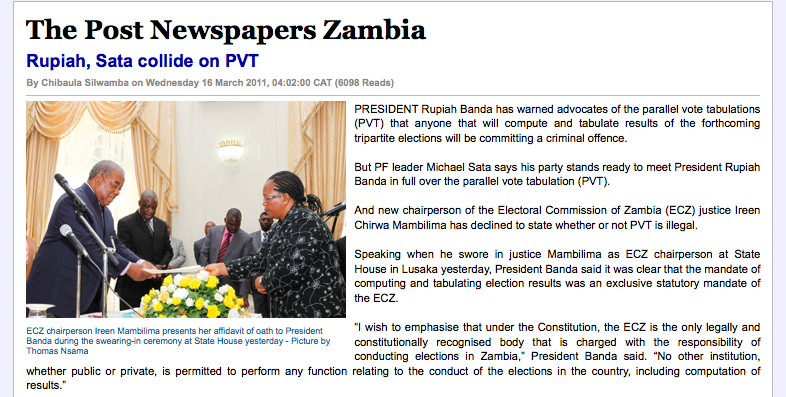
Newspapers, both state-owned and private, scream the election promises of politicians. Talk radio programs are full of the opinions of voters and TV news bulletins of the national broadcaster offer generous campaign coverage of the incumbent President, Rupiah Banda.
Strike up a conversation in a taxi in the capital Lusaka, and at some point, talk with the driver will invariably turn to politics and what is good for "the people".
It was against this background of elections that the DW-Akademie conducted a training course in Lusaka with radio journalists on Interviews and Talkshows. And, it wasn't any surprise that our participants wanted to explore political themes, develop their skills to interview politicians and discuss ways to improve talkshow programming during the election campaign.
![]() read more
read more
Interview and Talkshow training – get the basics right and listen
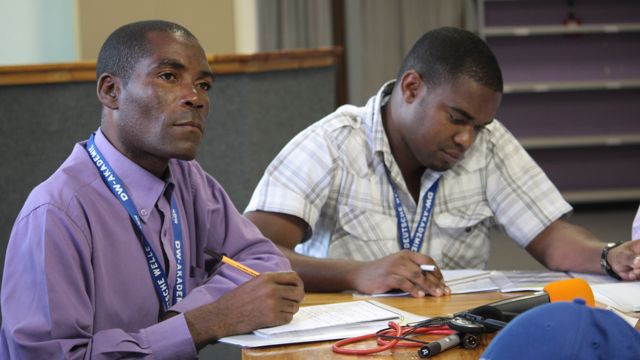
Interviews can be daunting and challenging for young journalists – especially if they are broadcasting live or moderating a talkshow dealing with controversial topics. In this guest blog post, Carsten von Nahmen, Head of the DW-AKADEMIE Africa Team, offers some insight on getting the basics right.
![]() read more
read more




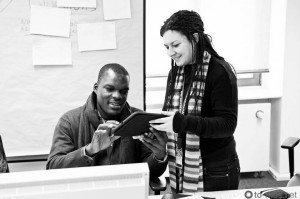
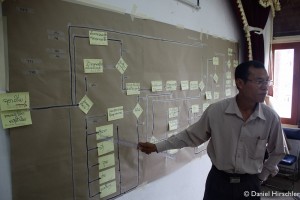
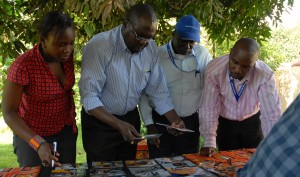




Feedback